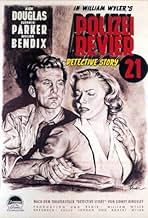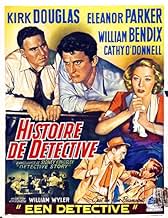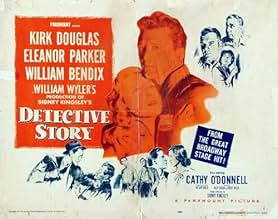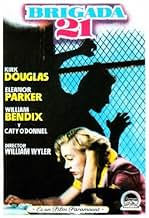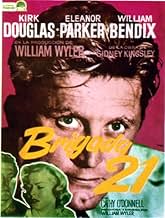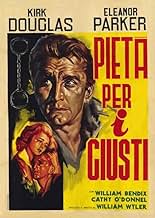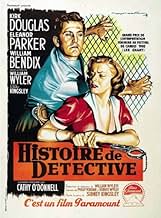IMDb RATING
7.5/10
9.9K
YOUR RATING
On one day in the 21st Precinct squad room, assorted characters form a backdrop for the troubles of hard-nosed Detective Jim McLeod.On one day in the 21st Precinct squad room, assorted characters form a backdrop for the troubles of hard-nosed Detective Jim McLeod.On one day in the 21st Precinct squad room, assorted characters form a backdrop for the troubles of hard-nosed Detective Jim McLeod.
- Director
- Writers
- Stars
- Nominated for 4 Oscars
- 7 wins & 11 nominations total
William 'Bill' Phillips
- Det. Pat Callahan
- (as William 'Bill' Phillips)
- Director
- Writers
- All cast & crew
- Production, box office & more at IMDbPro
Featured reviews
Adapted from a stage play by Sidney Kingsley, "Detective Story" depicts a day at a New York police precinct in the early 1950's. The film resembles a feature-length episode of "Barney Miller" without the jokes as the detectives bring various shoplifters, petty thieves, and embezzlers into the station for booking. However, the film does not lack humor as a broad hammy performance by Joseph Wiseman and an only slightly subtler take on a Brooklynese shoplifter by Lee Grant lighten up the often heavily dramatic proceedings.
The central character, Detective Jim McLeod, is an unforgiving, by-the-book veteran, who sees the world in black and white, good versus evil, with no shades of gray in between. Kirk Douglas brings McLeod to life in one of his finest, most powerful performances. Douglas's Oscar-caliber work is matched by a fragile, deeply felt performance by Eleanor Parker as McLeod's wife, who harbors a secret from her past that, unknown to either McLeod or his wife, connects back to an on-going police case. The scenes between Douglas and Parker are among the best in the film.
Veteran director William Wyler retains most of the play's action in the central precinct room and only occasionally breaks from the claustrophobic set for a breather. Lee Garmes photographed "Detective Story" in crisp black and white, and some of the shots of New York City could be framed and hung on a wall. With a cast of top character players that includes Gladys George, William Bendix, Frank Faylen, and George Macready, the multi-character, multi-plotted "Detective Story" is a powerful, well-acted film that somehow is less often seen than its quality warrants.
The central character, Detective Jim McLeod, is an unforgiving, by-the-book veteran, who sees the world in black and white, good versus evil, with no shades of gray in between. Kirk Douglas brings McLeod to life in one of his finest, most powerful performances. Douglas's Oscar-caliber work is matched by a fragile, deeply felt performance by Eleanor Parker as McLeod's wife, who harbors a secret from her past that, unknown to either McLeod or his wife, connects back to an on-going police case. The scenes between Douglas and Parker are among the best in the film.
Veteran director William Wyler retains most of the play's action in the central precinct room and only occasionally breaks from the claustrophobic set for a breather. Lee Garmes photographed "Detective Story" in crisp black and white, and some of the shots of New York City could be framed and hung on a wall. With a cast of top character players that includes Gladys George, William Bendix, Frank Faylen, and George Macready, the multi-character, multi-plotted "Detective Story" is a powerful, well-acted film that somehow is less often seen than its quality warrants.
William Wyler, who won three Oscars for Best Director ("Mrs. Miniver", "The Best Years of Our Lives", "Ben-Hur"), and been nominated a record 12 times between 1937 and 1966, is not often thought of as one of our "great" directors. Truly, he was. Here, with the filmization of Sidney Kingsley's stage play about a NYC police station, focusing on the amazingly bad day which has been happening to Detective Kirk Douglas, Wyler shows his skill and diversity.
Kirk Douglas is the vision of a crumbling spirit disguised by toughness and authority. He towers over a stellar cast, including Eleanor Parker as his wife, William Bendix as one of the other officers in the precinct, and Lee Grant as an inexperienced shoplifter. The one actor who truly stands out from the rest is Joseph Wiseman, who is simply a spark plug made up as an actor, giving an astounding recreation of his stage role as an on-edge, cheap suit-wearing thief. He displays the physical dexterity of James Cagney in the physique of a beanstalk, and proves to be more dangerous than any other movie crook we'd seen in the past.
In one of the great Oscar follies of our time (and there were many), the 1952 voters neglected to nominate Douglas as Best Actor, or Wiseman in a supporting slot. Nominations were given out for Wyler's direction, the screenplay, and for Parker and Grant, lead and supporting actresses respectively. None for Best Picture, the other nominations were passed over in favor of "A Place in the Sun" and "A Streetcar Named Desire". And who was picked for Best Picture? Well, staying true to AMPAS's mission of picking only the most harmless movie of the year ("Driving Miss Daisy", "Chariots of Fire", "Shakespeare in Love"), instead of the best, they picked "An American in Paris", which will be remembered by film historians as merely a rehearsal for "Singin' in the Rain". Oh, well.
Kirk Douglas is the vision of a crumbling spirit disguised by toughness and authority. He towers over a stellar cast, including Eleanor Parker as his wife, William Bendix as one of the other officers in the precinct, and Lee Grant as an inexperienced shoplifter. The one actor who truly stands out from the rest is Joseph Wiseman, who is simply a spark plug made up as an actor, giving an astounding recreation of his stage role as an on-edge, cheap suit-wearing thief. He displays the physical dexterity of James Cagney in the physique of a beanstalk, and proves to be more dangerous than any other movie crook we'd seen in the past.
In one of the great Oscar follies of our time (and there were many), the 1952 voters neglected to nominate Douglas as Best Actor, or Wiseman in a supporting slot. Nominations were given out for Wyler's direction, the screenplay, and for Parker and Grant, lead and supporting actresses respectively. None for Best Picture, the other nominations were passed over in favor of "A Place in the Sun" and "A Streetcar Named Desire". And who was picked for Best Picture? Well, staying true to AMPAS's mission of picking only the most harmless movie of the year ("Driving Miss Daisy", "Chariots of Fire", "Shakespeare in Love"), instead of the best, they picked "An American in Paris", which will be remembered by film historians as merely a rehearsal for "Singin' in the Rain". Oh, well.
Kirk Douglas has always excelled in roles where he plays the maverick loner, walking the fine line between anger and insanity. Thus his role as Det. Jim McLeod in "Detective Story" is a real showcase for his acting talents. This is not a crime drama in the conventional sense where there is any real action or crime to solve, even though you have a room full of New York City police detectives on screen for just about the whole movie. Instead it is a character study of Jim McLeod, played by Kirk Douglas. McLeod's motivation in his work is not to solve crimes or even protect the innocent. Instead, he is motivated by a desire to root out evil by his definition of the word. Evil is something McLeod claims that anyone can easily spot. McLeod's world view doesn't differentiate between the one-time bad act of a basically good person, such as Arthur Kindred (Craig Hill), a young man who impulsively stole from his employer in a last ditch attempt to impress a girl he believed he loved, versus the misdeeds of a lifetime criminal, such as the homicidal maniac Charlie (Arthur Kindred), that has also been apprehended by the detective squad that same day.
When confronted by a mistake in the past of the person nearest to him, his own wife, McLeod is equally unforgiving. His rage and disgust is so great, you're not sure what bothers him more - the discovery of his wife's past or the failure of his own nose to sniff out the misdeed prior to this. By the time McLeod realizes his own inflexibility and lack of empathy have cost him what he loves the most, it is too late to undo the damage, and this leads to one last tragedy.
This is Douglas in an early fine if not huggable role, and is recommended viewing for that reason alone. William Bendix makes up for the lack of likability in Douglas' character as Detective Lou Brady, who likes to temper the letter of the law with a little humanity. Then there's a very young Lee Grant as a shoplifter who just can't stop babbling. Finally, there's Horace McMahon as Lieutenant Monaghan, head of the detective squad and the kind of boss we'd all like to have.
When confronted by a mistake in the past of the person nearest to him, his own wife, McLeod is equally unforgiving. His rage and disgust is so great, you're not sure what bothers him more - the discovery of his wife's past or the failure of his own nose to sniff out the misdeed prior to this. By the time McLeod realizes his own inflexibility and lack of empathy have cost him what he loves the most, it is too late to undo the damage, and this leads to one last tragedy.
This is Douglas in an early fine if not huggable role, and is recommended viewing for that reason alone. William Bendix makes up for the lack of likability in Douglas' character as Detective Lou Brady, who likes to temper the letter of the law with a little humanity. Then there's a very young Lee Grant as a shoplifter who just can't stop babbling. Finally, there's Horace McMahon as Lieutenant Monaghan, head of the detective squad and the kind of boss we'd all like to have.
This top-notch police story rises far above the norm for its type. A true example of ensemble acting, the film incorporates many well-known character actors all putting in first-rate work, led by the superb efforts of Kirk Douglas and William Bendix, the latter in what may be his best screen role. This may be one of the earliest examples of the "typical day" genre, in which multiple story lines occurring in a single day in a certain locale are melded into a whole (a genre exemplified by the "Hill Street Blues" and "Barney Miller" of tv). An excellent script and good direction, aided by interesting characters, keep the dramatic tension moving along briskly to the searing conclusion. This is not your run-of-the-mill police story, and is definitely worth a see.
Some films are so full of life they have to be seen again and again. I first saw this one in my early teens and loved it, despite difficulty in understanding it. Decades later I still love it, and always will. It has its flaws: everybody overacts (beautifully), as if on stage. The writing is a bit too well-structured, almost like clockwork, the characters are a bit too symbolic and easy to categorise. The comic relief kicks in just on schedule. The psychological diagnosis is too precise. And yet, this is one of the greatest films ever made. It has a sense of respect for the totality of life, and makes tragedy almost poetic. Fascinating though the plot may be, the essence of this film goes beyond plot. It's a symphony of cacophony. The playwright would have made a fine composer.
Did you know
- GoofsIn some of the close-up shots of McLeod and Schneider in the back of the paddy wagon, McLeod's shadow can be faintly seen on the rear-projection screen showing the street behind them. (Other shadows can also be seen.)
- Quotes
Detective James McLeod: I built my whole life on hating my father. All the time he was inside me, laughing.
- ConnectionsFeatured in Paramount Presents (1974)
- How long is Detective Story?Powered by Alexa
Details
- Runtime1 hour 43 minutes
- Color
- Aspect ratio
- 1.37 : 1
Contribute to this page
Suggest an edit or add missing content



